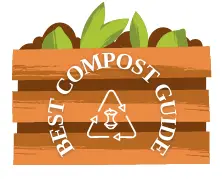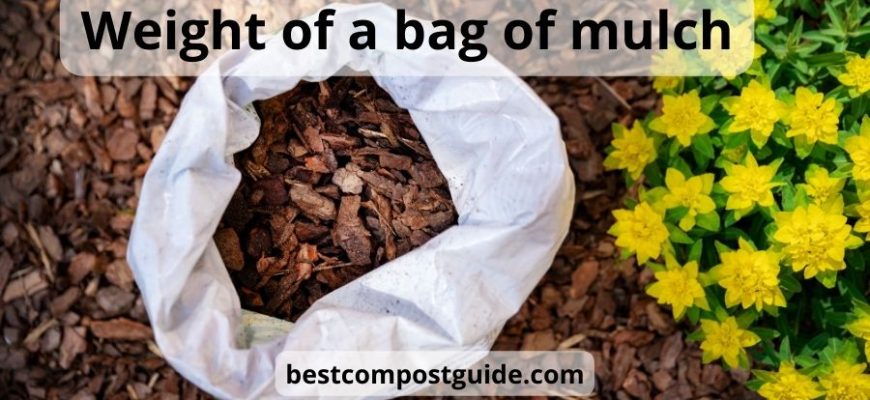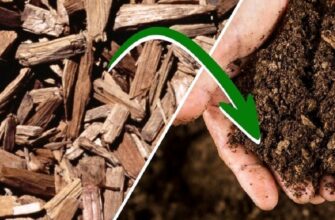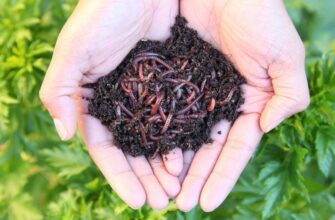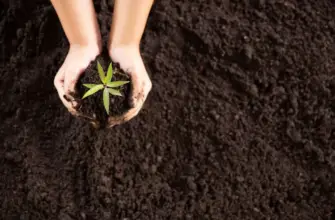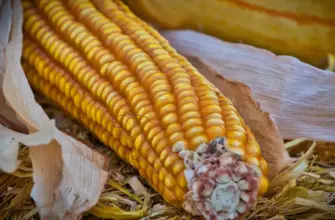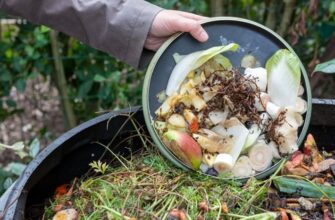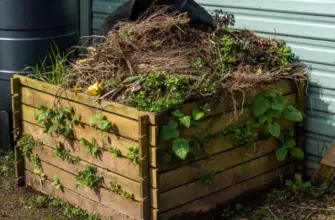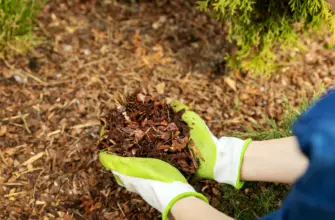How much does a bag weigh? Wood mulches, compost mulch, or any other substances are a good way to reduce your activities in the garden. It prevents weed appearance. The mulch also helps with moisture retention. Not only does it prevent extra watering of your flower beds, but it is a perfect decision to improve the landscape of your outdoor space.
Meanwhile, the important thing is to count how much mulch is required. If you don’t do it properly, you’ll waste lots of money and time because of purchasing too much material. In the other case, you will run out of mulch before it covers all the surfaces you need to cover. That means you will visit a store twice.
Furthermore, you have to choose a way of delivering the bags of mulch. Will it be enough space in your car? Would it be better to order delivery by truck? To find out, you need to do the correct calculation.
By reading this article, you will learn all the details. Let’s get started!
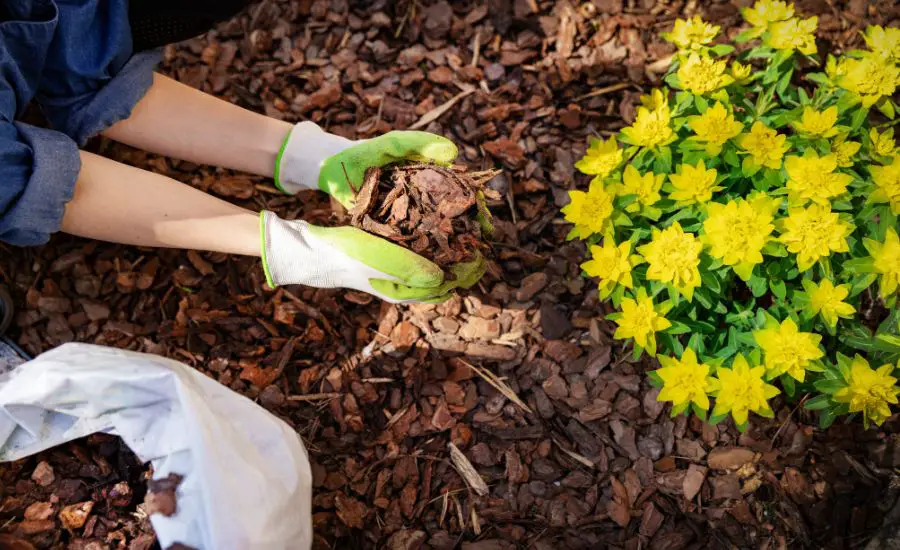
- The weight of a bag is related to several factors
- How much does a bag of mulch weigh?
- Organic mulch (straw mulch, wood mulch, etc.)
- Inorganic mulches (rubber mulch, etc.)
- Packages
- Square footage
- The mulch layer thickness
- The table
- The things to consider
- Is it really necessary to buy such heavy bags?
- Frequently asked questions
- How much does a 2-cubic bag of mulch weigh?
- How much does a 2-cubic foot bag of black mulch weigh?
- How much does a 1.5-cubic bag of mulch weigh?
- How much area does 1 bag of mulch cover?
- Can I get along without it?
- Can it be harmful?
- What should I do if I am not sure about the number of boxes?
- Summary
The weight of a bag is related to several factors
There is no universal answer to how much mulch weighs. It depends on the situation. Several factors have to be considered. Here they are.
The first factor is a sort of mix. You can take wood mulch, bark mulch, straw mulch, rubber mulch, river rock mulch, compost mulch, etc. As you know, rocks are heavier than compost mulch.
As a result, one bag of mulch is heavier than the others of the same volume.
The second factor is volume itself. Manufacturers usually produce 1 cubic foot bag of mulch materials, 2 cubic feet, 3 cubic feet, and so on. Of course, a bag of mulch volume influences weight.
The third important thing is the substance condition. For instance, wet wood mulch weighs twice more than dry wood mulch.
How much does a bag of mulch weigh?
Here are the tables.
Tables of how much mulch weighs (lb): Sort of cover, Volume
Organic mulch (straw mulch, wood mulch, etc.)
Straw mulch
- 1 cu ft or 0,04 cubic yard: 20
- 2.5 cubic feet: 50
Compost mulch
- 1 ft or 0,04 cubic yard: 44
- 2 cubic feet of mulch: 88
- 2.5 cubic feet: 110
Wood mulch (dry/wet)
- 1 ft or 0.04 cubic yard: 10 / 20
- 2 cubic feet: 20 / 40
- 2.5 ft: 25 / 50
- 3 cubic feet: 30 / 60
Inorganic mulches (rubber mulch, etc.)
Marble chips
- 1/2 cubic feet: 45
- 1 ft or 0.04 cubic yard: 90
- 1.5 cubic feet: 135
Shredded rubber mulch
- 1/2 cubic foot bag: 22
- 1 ft or 0,04 cubic yard: 44
- 1.5 cubic feet: 66
Lava rock mulch
- 1/2 cubic feet of mulch: 18
- 1 ft: 36
- 1.5 cubic feet: 54
River rock mulch
- 1/2 cubic feet of mulch: 50
- 1 cubic foot bag: 100
- 1.5 cubic foot bag: 150
Egg rock mulch
- 1/2 cubic feet of mulch: 45
- 1 cubic foot bag: 90
- 1.5 cubic foot bag: 135
How much does a bag weigh? Now, you have known it. But this knowledge is not enough. What about the question of how many bags you have to buy to obtain your goals? Let’s talk about it in the next paragraph.
Packages
How much mulch cover do you have to apply to improve fertility? Of course, it depends on the square footage.
The important thing is also the sorts of flowers you have got in the garden beds.
Square footage
First, get the footage. It is necessary to count how much mulch is required. It’s quite easy to do.
Use the following formula:
Square of the field = The length x The width
What should you do if your field isn’t rectangular?
Imagine that it has a regular shape, measure the hypothetical sides of the rectangle, and use the formula you have already learned. Of course, you will get only approximate figures. That’s why it would be better to order a bit more wood mulches, compost mulch, etc. if you mind going to a store twice.
The mulch layer thickness
It is extremely important. The common thickness that experts usually advise is 2 to 4 “. Such a layer of mulch is definitely enough to retain water and other useful components in the soil. It also prevents the weed appearance.
Consider that a layer of compost mulch (or other kinds) that is thicker than 4 ” can be harmful to your plants. Compost mulch can be a barrier to the sun and moisture if you are too generous in mulch covering. Please be careful with it.
At the same time, if you don’t have any plants, and you want to apply mulch for the sake of landscape, this is only about efficiency and economy.
The table
So, you have already measured all the fields and decided to cover the surface with 2 0r 4 ” of mulch layer.
Here is the table that will help you to recognize how many bags of bark mulch or pine bark you need to order.
Table: Square footage (sq ft), Wood mulch layer (“)
50
- 2 “: 8.25 cu ft or 4 bags of wood mulch (2 cubic foot bag)
- 4 “: 16.5 ft or 8.25 bags (2 cubic feet bags)
100
- 2 “: 16.5 ft or 8.25 bags (2 cubic foot bag)
- 4 “: 33 ft or 16.5 bags (2 cubic feet bags)
150
- 2 “: 24.5 ft or 12.5 bags (2 cubic feet bags)
- 4 “: 49.5 ft or 24.75 bags (2 cubic feet bags)
200
- 2 “: 33 ft or 16.5 bags of mulch (2 cubic feet bags)
- 4 “: 66 ft or 33 bags of mulch (2 cubic feet bags)
Is there no your garden’s footage on the table? Use the following formula:
Amount of 2 cubic feet bags = 0,33 x sq ft : 2
For instance, if you have a field of 500 sq. ft., you will perform the next calculations:
500 x 0,33 : 2 = 82.5
As you can see, it is quite easy to do.
The things to consider
Ok, you have already got how much your mulch weighs. Maybe you’ll put it in a small flower bed. In this case, most likely, you have found out that you can carry on the purchase and go home even by bus. Maybe, the ordered bags are not quite heavy to put into your car.
Or the amount of bags of mulch is so huge that it is better to get a truck.
Anyway, you have to know some things that help to get the goods and apply them easily.
Here are the tips:
- Take a bit more material than you really need. Otherwise, it will be a waste of time. In this case, you will definitely go to the store twice. It is an experience for hundreds of people. Mulch always runs out at the worst possible time, when two or three square feet of a garden remain uncovered.
- Do not be attracted by an extremely low price. Most likely, it is a trick or fake. Maybe, a store provides goods of low quality. In this case, your plants can die after a while, or you will get undesired weed growth.
- Use inorganic mulches if you don’t want to change the layer for a long time. Organic mulch has lots of advantages but it doesn’t have a long lifespan. Meanwhile, bags of inorganic mulch weigh too much. Stones are heavy, aren’t they? They are not fit to carry on because of it. But they are popular because of their long lifespan.Anyway, the decision is yours. You have already got enough information to make the right choice.
- Prepare a dry and clean place to unload the mulch you have ordered to deliver. Otherwise, your goods can be spoiled before use. In that case, the efficiency of the mix goes down. You’ll get a lot of weed and everything.
- If you are not sure about the amount of bags of mulch you need to cover the flower beds, ask an expert. The expert will do all the calculations properly. So, you will save your money and your time.
- Give your flowers some water and get rid of dirt-pulling weeds before mulching. Remember that the cover works as a barrier. The layer saves moisture and minerals in the soil. At the same time, it blocks the moisture going from outside. As for weeds, the mulch layer prevents an undesired and harmful plant appearance but it cannot remove it from a flowerbed.
- If you have a large homestead, take a lot of mulch at once. In that case, the price will be lower. The important thing is also a way of delivering. The most comfortable method is buying pallets. There are dozens of bags on a pallet. A certain amount depends on the store that you are going to visit.
Is it really necessary to buy such heavy bags?
In the very beginning, it seems quite complicated to calculate the weight of bags. Do you really need it? The soil itself is a sufficient substance to let the flowers and other plants grow, isn’t it? Maybe, you are right. But the thing is that your efforts in counting, choosing, buying, delivering, and covering the soil with mulch are worth it if the summers where you live are really hot.
Here are some advantages of mulch usage:
- The special cover retains moisture.
- Root systems are kept from overheating in summer.
- Root systems are kept from frost in winter.
- Your garden has a good look.
- Useful elements remain in the ground.
- Weeds don’t grow up.
- Harmful insects don’t appear.
At the same time, mulch usage has some disadvantages. Here they are:
- You have to spend more time and money to handle it.
- If your homestead is located in a rainy place, the plants soon rot.
- Sometimes, organic mulch attracts ants, mouses, moles, etc.
So, the main idea is that if you live in a hot place, you better use mulch, be aware of how much mulch you need, and be aware of how much mulch weighs.

Frequently asked questions
How much does a 2-cubic bag of mulch weigh?
It depends on the sort of mulch. There is straw mulch, rubber mulch, wood mulch, etc. For example, wood mulch weighs 20 lb if it is completely dry. A bag of wet mulch weighs approximately 40 lb.
Stones are the heaviest cover. It is bad for delivery and operating with it. But they have a long lifespan.
How much does a 2-cubic foot bag of black mulch weigh?
Two cubic feet of mulch weigh about 30 to 50 lb.
How much does a 1.5-cubic bag of mulch weigh?
It depends on what sort of mulch you have got. For instance, if it is marble chips, the weight is around 135 lb. Yes, stone mulches are heavy. Straw mulch weighs not so much.
How much area does 1 bag of mulch cover?
There is no universal answer, it depends on:
• The type of mulch (straw mulch, compost mulch, wood mulch such as cedar mulch, wood chips, other organic mulches, non-organic mulches such as shredded rubber mulch, etc.)
• The thickness of the layer
• The volume of a bag
For example, a 2-cubic bag of bark powder is enough to cover an area of about 12.5 square feet with a 2 inches layer.
Can I get along without it?
Yes, you can. But it would be better for your plants to cover the soil with special material. It prevents erosion, insects’ appearance, lack of moisture, etc. By the way, if you live in a hot climate, it is strongly recommended to use such materials.
Of course, it takes some time and money to arrange all the deals. But eventually, you will be rewarded. You won’t have to water your flowers too frequently. It won’t be necessary to struggle with insects and undesired and annoying weeds. Most experienced gardeners use such substances to cover the soil.
Can it be harmful?
Most likely, it won’t be harmful to your plants. On the contrary, it will be useful. But in some cases, you better avoid such material usage. They are bad for flowers if they grow in a rainy place, and you have chosen the wrong material. Anyway, if you cannot decide what to do, just contact an expert or ask your experienced neighbors whether they use such materials or not.
What should I do if I am not sure about the number of boxes?
It is better to contact an expert who will definitely handle all the calculations and accept your order to execute the delivery.
Summary
There is no certain answer to how much mulch weighs. You have to keep in mind:
- The type of substance (compost mulch, lava rock mulch, pine bark, etc.)
- The volume of a bag
- The thickness of the layer you wish to apply
The most common mulch is organic mulch (bark or wood chips, for example). The most common package is a 2 cubic feet bag. Most people usually apply 2 inches of cover.
How much mulch do you need? So, if you would rather not waste your time calculating the figures, and you don’t mind the most popular choice, the bag of dry mulch weighs about 20 lb. If it is wet, its weight is 40.
How much does any other type of wood mulch weigh? What about compost mulch? How many cubic feet do you need? How much does a bag weigh? There is a table in this article that gives all the answers.
